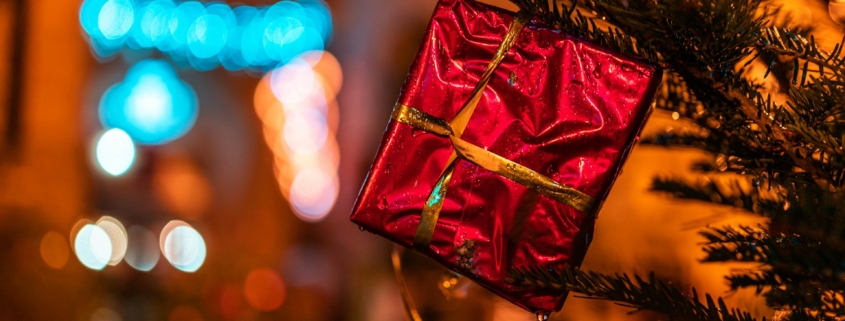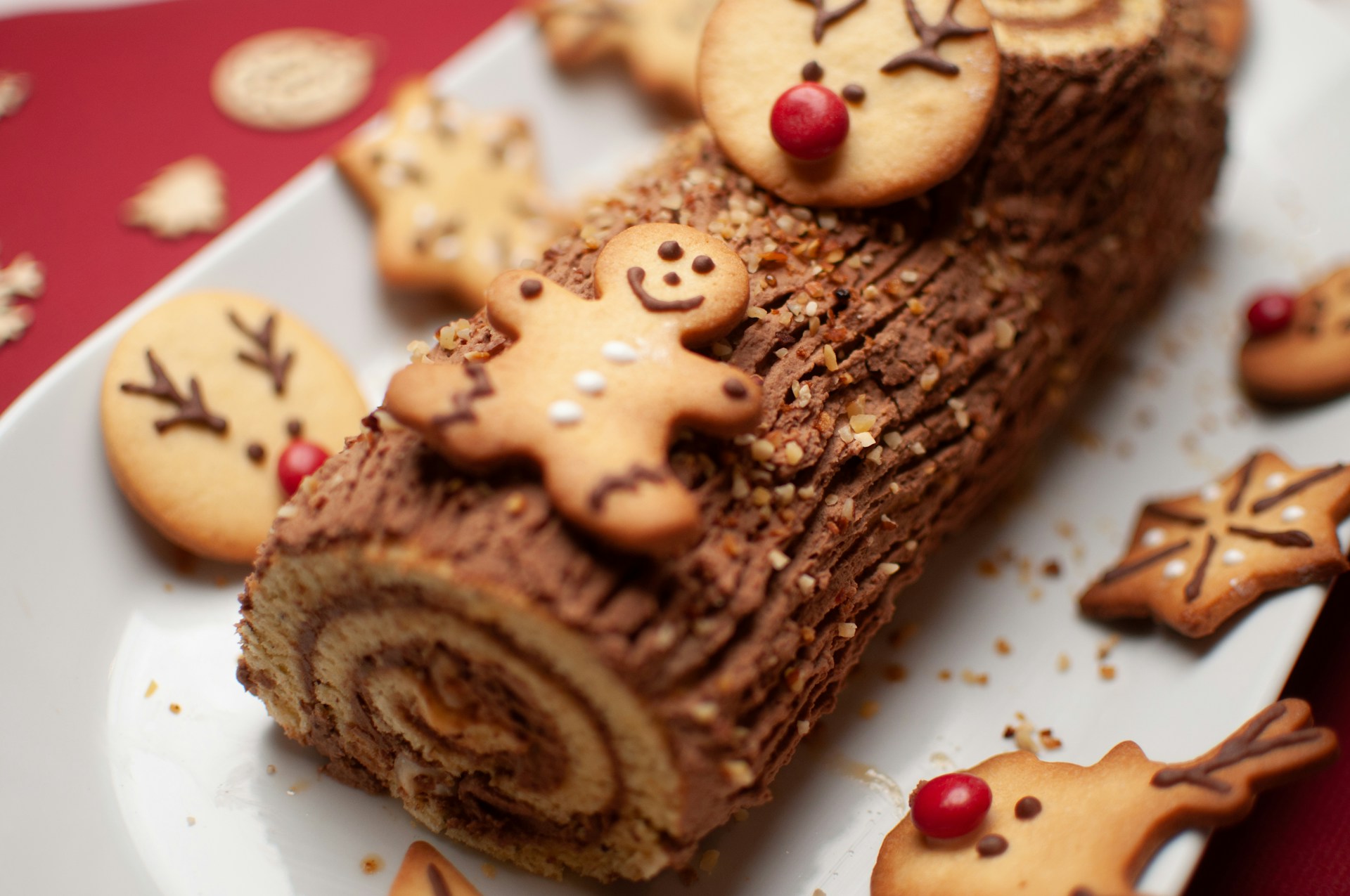France in December is a kaleidoscope of garlands, the smell of baking, and anticipation. City squares turn into stages covered with thousands of lights, while shop windows compete in creativity. In France, holidays are celebrated with flair: Christmas is a family spectacle with dinner lasting until morning, and New Year’s Eve is a lively finale with champagne and fireworks.
» READ MORE – 10 ideas for celebrating Christmas and New Year in Prague
Preparing for the holidays – anticipation and shopping
The first weeks of December in France are already colorful: garlands hang in the streets, Advent calendars appear in homes, and bakeries release new batches of gingerbread cookies.
Book a hotel in ParisFrom this moment, the country begins to live in anticipation of the holidays, and tourists become noticeably more numerous – it’s better to book hotels in advance.
» READ MORE – 1 January in Paris: how to start the new year?
Christmas markets
The festive season in France begins with markets. In Strasbourg, Paris, and Lyon, wooden chalets appear, selling gingerbread, candles, and decorations. The Strasbourg market has been operating since the 16th century and is considered the oldest in Europe. In Provence, look for a special souvenir – clay «santons,» without which the Christmas nativity scene would be incomplete.
» READ MORE – The best Christmas markets in Europe
As a rule, Christmas markets are open until 24 December, giving everyone time to buy gifts for their loved ones and prepare for Christmas dinner.
There are never any discounts in December – that’s a myth. French sales always take place at the same time: from mid-January to mid-February and from late June to early August.
The Christmas Capital
Strasbourg proudly bears the title of Capitale de Noël. A giant fir tree in Brockley Square, bright garlands in narrow streets, and thousands of visitors from different countries transform the city into the true festive capital of France. Here, Christmas traditions take on their most theatrical forms.
» READ MORE – Christmas market in Strasbourg
The heart of the holiday – Christmas (Noël)
Before talking about Christmas Eve, it’s worth noting that this evening is the culmination of all preparations when anticipation finally turns into a real celebration.
Book a hotel in StrasbourgOn Christmas Eve
On 24 December, all of France gathers around the table to celebrate Christmas. Réveillon is a marathon of feasting that ends late at night. After dinner, many go to mass, and children wait for Père Noël to visit and leave gifts under the tree or in their shoes by the fireplace.
The French like to joke: «The most important thing at Christmas is stomach endurance.» Oysters, foie gras, turkey with chestnuts, a cheese platter, and the final chord – Bûche de Noël, a log-shaped cake. In Provence, they add 13 desserts to this – and try explaining to your guests that enough is enough!
You can almost always find real champagne or good white wine on the table. The traditional dessert is the Yule log cake.
» READ MORE – Traditional Christmas dishes from 10 European countries
Who brings the presents?
The main character of the holiday is Père Noël. But he also has a «dark side» – Père Fouettard, a character meant for educational purposes. However, modern children are hardly afraid of him, preferring to believe in the kind and cheerful Santa Claus.
Christmas is more important than New Year’s Eve
For the French, Noël is more important than any other celebration: it’s a time for returning home, long conversations, and family warmth. New Year’s Eve is joyful, but still secondary. The main holiday in France is Christmas.
Incidentally, snow at Christmas and New Year in France is far from guaranteed and doesn’t even occur every year. It’s more likely to appear in the north-eastern regions – Alsace, Lorraine, and Nord-Pas-de-Calais.
» READ MORE – How Vienna celebrates Christmas and New Year
New Year and the end of the festive period
After Christmas, attention gradually shifts to another celebration – New Year’s Eve, which the French call La Saint-Sylvestre and celebrate in a completely different format.
» READ MORE – Christmas in Dresden with Saxony’s most delicious tradition
New Year’s Eve – La Saint-Sylvestre
On 31 December, France takes to the streets and celebrates noisily: champagne flows freely, fireworks light up the sky, and Parisians dance right on the Champs-Élysées. Gifts are symbolic since the main ones were given at Christmas.
On New Year’s Eve, it’s customary to kiss under the mistletoe for good luck, drink champagne, and exchange congratulations.
Epiphany (6 January)
The final holiday is Épiphanie. The French cut the Galette des Rois, a king cake with almond cream. If you find a figurine in your slice, you wear a paper crown and are king for the day. It’s no joke – even adults eat the cake with childlike enthusiasm for this reason.
Orthodox Christmas
7 January is a quiet day in France: it’s not a public holiday. But in the Orthodox churches of Paris and Marseille, services bring parishioners together, adding another touch to the country’s festive palette.
Holiday shopping
When the holidays come to an end, another important moment arrives – the sales. Shopping after New Year’s in France has become almost as traditional as oysters on the Christmas table.
Christmas sales
If you dream of discounts, you’ll have to be patient in France. The big sales start in January, after New Year’s. Before Christmas, there’s just a warm-up – discounts on toys and decorations. But the real hunt begins with the January soldes.
Weekends and holidays
25 December and 1 January are official holidays, and school vacations last almost three weeks. France seems to press pause to rest during both Christmas and New Year.
And here’s another little life hack: the second week of January is probably the least popular time to visit Disneyland Paris. Children will enjoy this holiday much more than any Christmas.
» READ MORE – Christmas and New Year at Disneyland Paris
In France, it’s simple: Christmas is for family, New Year’s Eve is for friends. One is filled with candles, gifts, and oysters; the other – with champagne and fireworks. Together, they make winter in France a season when you want to sing, eat, and celebrate without stopping.




 Dimitris Vetsikas / Pixabay
Dimitris Vetsikas / Pixabay  Marcel Dominic / Pixabay
Marcel Dominic / Pixabay  Spenser Sembrat / Unsplash
Spenser Sembrat / Unsplash  Kevin Gaudin / Flickr / CC BY-ND 2.0.
Kevin Gaudin / Flickr / CC BY-ND 2.0.  Hugues de BUYER-MIMEURE / Unsplash
Hugues de BUYER-MIMEURE / Unsplash  Prabhat Saurav / Unsplash
Prabhat Saurav / Unsplash  Ketevan Salia / Unsplash
Ketevan Salia / Unsplash lo lindo / Unsplash
lo lindo / Unsplash
Leave a Reply
Want to join the discussion?Feel free to contribute!